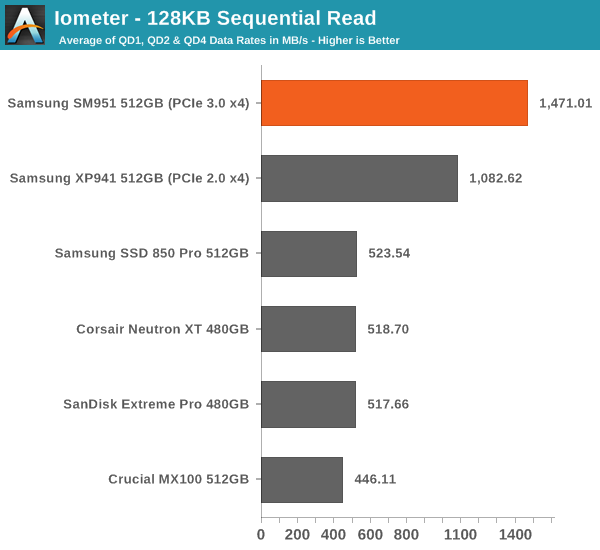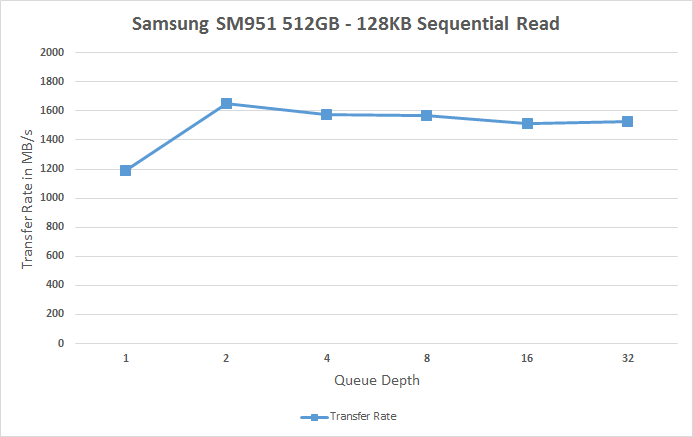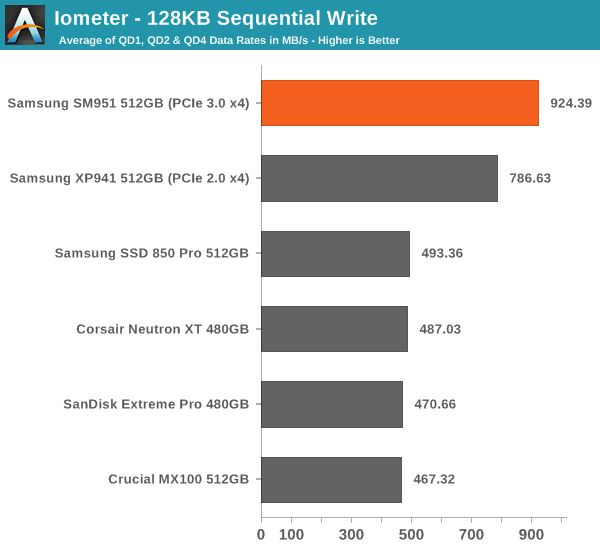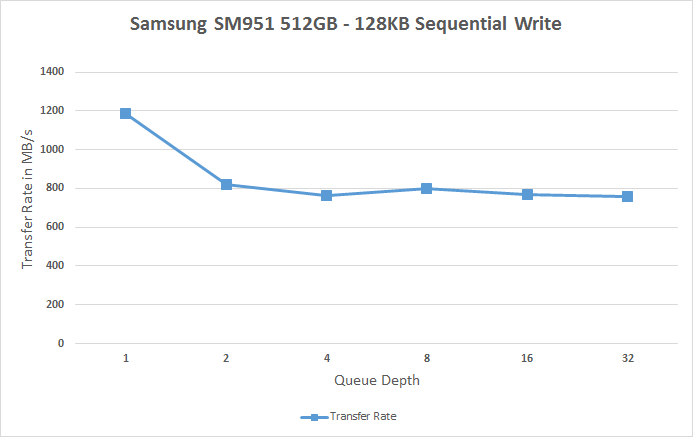Samsung SM951 (512GB) PCIe SSD Review
by Kristian Vättö on February 24, 2015 8:00 AM ESTSequential Read Performance
Our sequential tests are conducted in the same manner as our random IO tests. Each queue depth is tested for three minutes without any idle time in between the tests and the IOs are 4K aligned similar to what you would experience in a typical desktop OS.

The sequential tests really show the benefit of PCIe 3.0 because the SM951 is approximately three times faster than a SATA 6Gbps drive and provides a ~40% upgrade over the XP941.
 |
|||||||||
The line graph does reveal some anomalies, though. First it looks like the performance scales nicely, but after queue depth of two the performance actually degrades. I'm doing some thermal throttling tests later in the article and it's very likely that the read results are affected by that because I was able to reach 2250MB/s at queue depth of 32 with a cold drive (i.e. I went straight to QD32 without doing the scaling first that heats up the drive).
Sequential Write Performance
Sequential write testing differs from random testing in the sense that the LBA span is not limited. That's because sequential IOs don't fragment the drive, so the performance will be at its peak regardless.

Sequential performance is also great, but seems to be affected by thermal throttling even more. That said, I did reach over 1500MB/s with a cold drive.
 |
|||||||||










128 Comments
View All Comments
blanarahul - Tuesday, February 24, 2015 - link
Can't wait to see what Intel brings to the table considering the amount of focus they put on consistency.extide - Tuesday, February 24, 2015 - link
I'm not sure that we will see anything too interesting client side from them. They seemed to have moved all their focus to the enterprise side, which is of course where the bulk of the money is.FWIW, Intel already has a PCIe SSD that is arguably faster -- the Intel SSD DC P3700
dylan522p - Tuesday, February 24, 2015 - link
Is, not arguablyStuka87 - Wednesday, February 25, 2015 - link
It is faster, and certainly more reliable. Intel has the best enterprise SSDs on the market.FunBunny2 - Wednesday, February 25, 2015 - link
-- Intel has the best enterprise SSDs on the market.Among consumer facing companies, perhaps. The real enterprise SSD/flash players are largely unknown to AnandTech and its readers.
monsted - Wednesday, February 25, 2015 - link
I'd love to see the results of a HDS FMD compared to the usual suspects.Kristian Vättö - Wednesday, February 25, 2015 - link
We've had this conversation before and I'll tell you this again: the majority of flash array vendors are using SSDs from Intel, SanDisk, Samsung and others. There are some that design and build their own drives/blades (e.g. Violin and Skyera), but the vast majority is using third party drives as the heart of their flash arrays.GTVic - Wednesday, February 25, 2015 - link
All drives now should support eDrive.Railgun - Tuesday, February 24, 2015 - link
At the rate I'm going, I'll end up with one of these before my XP941 ever gets powered up once, retail or otherwise.Laststop311 - Tuesday, February 24, 2015 - link
Disappointed in lack of 1TB size/ no 3d vnand/ no nvme. I planned on using 1 of these in 1TB size for a boot drive for a skylake-e build. The good news is I have a couple years for samsung to fix those issues.